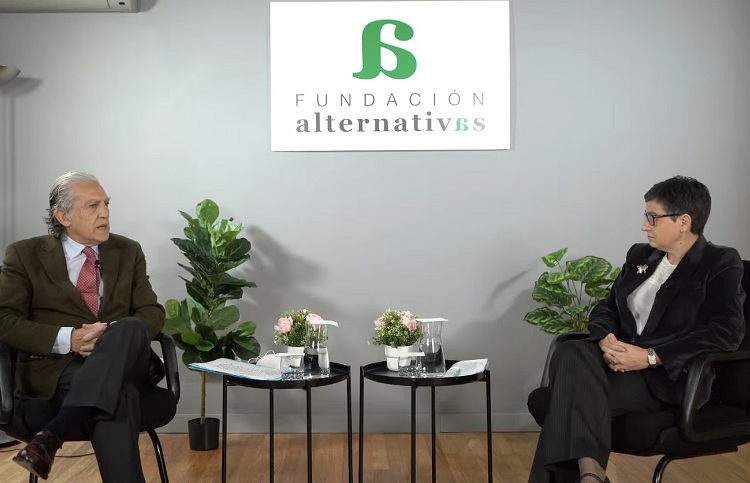Eduardo González
The Minister of Foreign Affairs, Arancha González Laya, yesterday called for a “serious debate” within the EU on “the ravages of tax dumping” within Europe and warned, in a clear allusion to the Netherlands, that “in the same way that some countries are being asked to take responsibility” with regard to recovery funds, “others must exercise more responsibility in the field of taxation”.
González Laya made these statements during his intervention in the online debate entitled Conversation with the Minister of Foreign Affairs. Spanish foreign action strategy, organised by the Fundación Alternativas and moderated by the executive vice-president of the think tank, and former Secretary of State for the EU, Diego López Garrido.
“A country’s Foreign Action is not just a collection of activities or pronouncements; it must have a backbone based on a series of principles and values that Spain wants to project and promote in the world”, the minister explained during her speech, in which she reiterated her usual arguments on the Government’s Foreign Action Strategy 2021-2024. For this reason, she continued, the Strategy should be based on a “more long-term” vision of “the forces that drive international relations”, an aspect in which, she admitted, the West is at a disadvantage with respect to China because the “projections” of the Asian giant “are not made for four-year electoral cycles, but for 50 or 100 years, something that we Western democracies lack”.
According to González Laya, one of the main international challenges facing Spain and the EU is “to reset the transatlantic relationship and redefine the compass of this relationship, because it lacks this compass”. “We have to give that relationship a long-term strategic sense”, including the need to “promote more solid democratic systems”, because “cracks in our democracies” are beginning to be detected. “The assault on Capitol Hill has shed light on the problem, but it is not only the assault on Capitol Hill, it is a problem shared by all democracies in the world, including full democracies such as Spain”, she warned. “We are concerned, as Blinken told me, about the need to work to solidify and nurture democracy in the world”, she said. González Laya and the US Secretary of State, Antony Blinken, held their first telephone conversation on 15 February.
Europe and tax dumping
On the other hand, the minister reiterated her support for multilateralism, which is “the sometimes pompous expression with which we mention international cooperation”, and stated, in this respect, that Spain’s multilateral strategy must pass through the sieve of the EU, because “Spain is a European country, and between us and multilateralism there is the European Union”. For this reason, she warned, it is necessary to “reinforce” Europe’s capacity as an international actor, a task in which Spain, as a “nodal, profoundly European country with no major conflicts with its neighbours”, can help by building “consensus” within the European Union itself.
The COVID-19 pandemic, according to González Laya, has demonstrated the need to “build greater European resilience in strategic technological, industrial, health, democratic, security and defence matters”, and to do so, he continued, it is necessary to “build a European consensus on fundamental issues, for example, on taxation, which is the basis of the new social contract”.
“We must begin a serious debate within the EU on the ravages caused by tax competition and tax dumping, because the more integrated we are, the more we will have to think about taxation in a way that shows solidarity”, she warned. “All” EU countries “agree” on the need to put an end to “tax dumping in digital activity, which creates inequality and weakens our democracies”, but “we must also push forward the debate on tax dumping within the EU, because this is also part of solidarity”, she continued.
“We have pooled the EU’s economic efforts with the pandemic”, a pooling that must be exercised “responsibly”, she declared. For this reason, she said, Spain and other countries have implemented “policies to guarantee more responsibility”, but “in the same way that some countries are asked for responsibility in the management of funds, other countries must exercise more responsibility in the field of taxation”.
The Netherlands, whose government (led by the liberal Mark Rutte) led the toughest positions during the negotiations on the European recovery fund, is among the EU states (along with Ireland and Luxembourg) that benefit most from favourable taxation for large multinationals (tax dumping), a situation that has begun to seriously worry the European Commission. In the midst of negotiations on the fund, in which the so-called frugal states led by the Netherlands opposed a recovery plan based on transfers and the mutualisation of debt, González Laya warned his Dutch counterpart, Stef Blok, that Spain is “a responsible country” that feels “in a position to ask the rest of the EU member states to also be responsible with the economy of all Europeans”.






